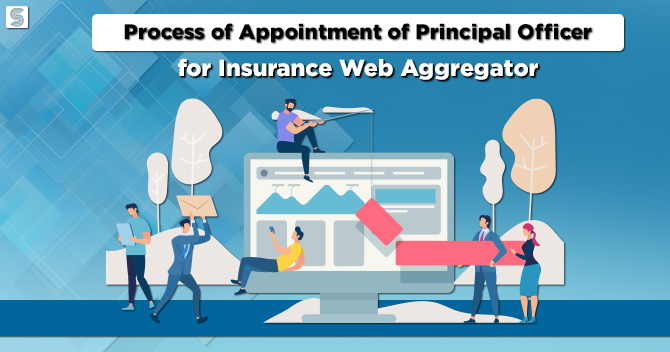How to Get the Certificate of Insurance Web Aggregator?

Dashmeet Kaur | Updated: Jan 22, 2020 | Category: IRDA Advisory
Seeking the right insurance service provider is like looking for a needle in a haystack. Many insurance agencies claim to safeguard the business, but it is often difficult to identify the right option. Therefore, Web Aggregators seems to be a perfect get through to resolve such problems. It is an intermediately that provides a platform to discover multiple insurance and financial products. Besides, the only way to function as a Web Aggregator is to register under the Companies Act, 2013. This blog entails all the necessary information about the procedure to obtain the certificate of insurance Web Aggregator.
Table of Contents
Roles and Responsibilities of a Web Aggregator
The fundamental duty that a Web Aggregator ought to perform is to enable an extensive comparison between different insurance products to the customers. Web Aggregators has a tie-up with well-reputed insurance companies wherein; they grasp a crux of their policies and services. Further, after attaining the certificate of insurance Web Aggregator, they display all the provided information on the website in a set format.
However, the We Aggregators cannot unveil the ratings and rankings that an insurance company receives. Also, it is prohibited to favour the best-seller or endorse any product. The website must only carry the details of the insurance companies, and the Web Aggregators should support no promotional activities.
Browse through our articles on services provided at Swarit Advisors, and just let us know if we can help you with your NBFC registration or NBFC for Sale or RBI Advisory Services.
Do’s and Don’ts for a Web Aggregator under IRDA
Insurance Regulatory and Development Authority of India (IRDA), has set some guidelines for Web Aggregators which are categorized as do’s and don’ts.
Do’s
- The certified Web Aggregators needs to display the product comparisons on their website along with the concerned insurers so that the customer can select the most suitable option as per their requirement.
- Further, the website must showcase the details of scope coverage, terms of the policies, premium terms and other considerable information about the product to prospective buyers.
- The online portal should also provide the insurer’s conditions for each product.
- A Web Aggregator has to receive all the leads and inquiries sent by the customers and thereby transmit those leads to the insurer in a clear manner.
- Also, Web Aggregator has to undertake the online sale process of insurance products and services.
- The insurance Aggregator must ensure that the customers don’t have to bear any inconvenience during the sale and purchase.
Don’ts
- Once an individual gains the certificate of insurance Web Aggregator, he cannot display any type of advertisement on his website. Specifically, there should be no promotion of any insurance products or services and other financial products/service on its website.
- Moreover, Web Aggregator should only operate one website at a time. He cannot run multiple online portals or tie-up with various unapproved, approved, and unlicensed entities to generate the leads.
- Web Aggregators shall not display any information about the services or products offered by other financial institutions/FMCG on its website.
- A Web Aggregator should not operate the websites of commercial/ financial/marketing entities. Also, he cannot utilize social media sites for the comparison of products.
- An Aggregator has to work in a particular manner as inscribed by the regulation. Thus, he must not adopt any other approach to transmit the leads to any insurance business entity.
Eligibility Criteria
Here is the list of eligible applicants who can apply for Web Aggregator license:
- Companies registered under the provisions of Companies Act,2013;
- Limited Liability Partnerships (LLPs) registered under the LLP Act, 2008;
- Any individual recognized by the Insurance Regulatory and Development Authority of India;
- In case, a company wants to attain the certificate of insurance Web Aggregator. Then it should have authorization in the company’s memorandum of association (MOA) to carry the business of Web-Aggregator;
- A Web Aggregator applicant should not be registered/ proposed to be registered as a corporate agent, insurance agent, or any other intermediary;
- Principle Officer shall undergo the training and possess the required qualification as prescribed in Form C of schedule I.
- Thereby, the Directors, Principle Officer, Partners, Promoters, and KMP shall meet the Fit & Proper criteria as per Form D of Schedule I.
Read more related articles : –
Capital Requirements for Web Aggregator License
An applicant must have sufficient capital to run the website of insurance web aggregator. The minimum capital requirement is as follows:
- To register under IRDA (Web Aggregator) Regulations, 2017 one must have a minimum net paid up or worth up capital of INR twenty-five lakhs.
- If the proposed insurance Web Aggregator is a company, then capital will get issued in the form of Equity Shares.
- Whereas, in case of LLP, the partners shall only contribute in the form of cash;
- The shares shall not get pledged in any manner to secure credit or other facilities. Also, it shall be unencumbered at all times.
Procedure to Procure the Certificate of Insurance Web Aggregator
Follow these simple steps to apply to the certificate of Web Aggregator registration:
- Firstly, the applicant has to apply to the regulating authority in Form A of Schedule I of IRDA (Web Aggregator) Regulation, 2017 with a non-refundable fee of INR 10,000/-.
- The applicant has the choice to either pay the fee online or draw a Demand Draft in the favour Insurance Development & Regulatory Authority.
- Now take the permit for Outsource & Telemarketing Functions through an application.
- Affix all the necessary documents with your application.
- Thereon, the authority will verify and scrutinize the application to validate its correctness. Besides, if the authority finds any incomplete information, then it may ask for additional information or documents.
- However, the authority has the power to reject an incomplete application. The authority will return the form with unfurnished information. Thus, the applicant has to file a new application along with the fees.
- An applicant who feels aggrieved by the authority’s decision can file an appeal to the Securities Appellant Tribunal (SAT) within 45 days of such an order.
- Whereas, if the authority feels that an application is entirely complete, then it may grant the certificate of insurance Web Aggregator in Form E of Schedule I.














